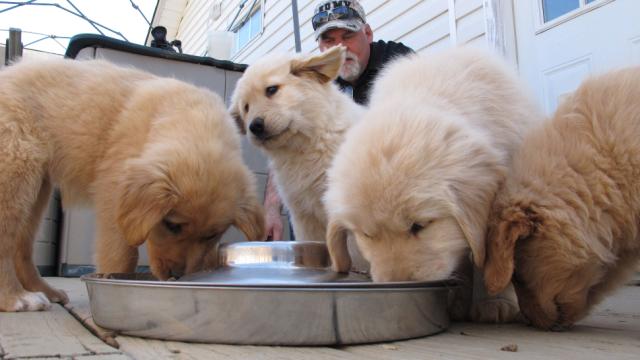New research shows that male dogs have been suffering from a rapid decline in fertility over the past three years, and all signs are pointing to contaminated pet foods as the culprit. The University of Nottingham researchers say a similar effect may be causing decreases in human male fertility.
Image: Associated Press
In a new study published in Scientific Reports, a research team led by UN’s Richard G. Lea has shown that the quality of sperm in stud dogs has fallen dramatically in the past 26 years. The researchers were able to demonstrate a potential link between the chemicals found in the sperm and testes of adult dogs with those found in some popular off-the-shelf pet foods.
“This is the first time that such a decline in male fertility has been reported in the dog and we believe this is due to environmental contaminants, some of which we have detected in dog food and in the sperm and testes of the animals themselves,” Lea said in a press release. “While further research is needed to conclusively demonstrate a link, the dog may indeed be a sentinel for humans — it shares the same environment, exhibits the same range of diseases, many with the same frequency and responds in a similar way to therapies.”
The researchers analysed thousands of stud dogs across five specific breeds: Labrador retrievers, golden retrievers, curly coat retrievers, border collies and German shepherds. Between 42 and 97 dogs were analysed each year over the course of the 26-year study, and Lea and his colleagues found that the dogs’ sperm counts have been steadily declining. From 1989 to 1998, sperm counts declined by 2.5 per cent each year, and from 2002 to 2014 they declined at a rate of 1.2 per cent per year. Genetic factors were ruled out as a contributing factor.
Furthermore, the male pups sired from these stud dogs had an increased chance of having cryptorchidism, a condition where the testes of pups don’t properly descent into the scrotum.
Sperm collected from these stud dogs and those from the general population were shown to contain environmental contaminants at levels capable of causing these reproductive issues. These included diethylhexyl phthalate (DEHP) and polychlorinated bisphenol 153 (PCB153) — chemicals proven to “perturb reproductive function in other species,” according to the new study.
These same chemicals were found to exist in a number of commercially available dog foods, including both wet and dry foods. In one case, a sample of dry dog food designed for puppies had higher concentrations of PCBs and other contaminants compared to other samples tested.
Other studies have suggested that human males are likewise experiencing a significant decline in semen quality, though a causal link has never been established. As Lea noted, this new study “raises the tantalising prospect that the decline in canine semen quality has an environmental cause and begs the question whether a similar effect could also be observed in human male fertility”.
So what does this mean as a pet owner? Not much, unless you’ve got plans for Fido’s reproductive future. It’s not clear if the concentrations of contaminants found in popular pet foods are affecting the health of dogs in other detrimental ways, but if you’re nervous about the kinds of foods your dog is eating, you should talk to your veterinarian.
